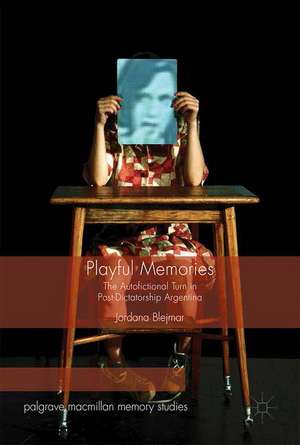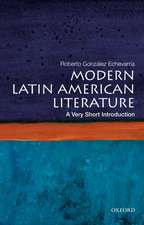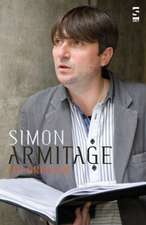Playful Memories: The Autofictional Turn in Post-Dictatorship Argentina: Palgrave Macmillan Memory Studies
Autor Jordana Blejmaren Limba Engleză Hardback – 6 ian 2017
This volume examines the blending of fact and fiction in a series of cultural artefacts by post-dictatorship writers and artists in Argentina, many of them children of disappeared or persecuted parents. Jordana Blejmar argues that these works, which emerged after the turn of the millennium, pay testament to a new cultural formation of memory characterised by the use of autofiction and playful aesthetics. She focuses on a range of practitioners, including Laura Alcoba, Lola Arias, Félix Bruzzone, Albertina Carri, María Giuffra, Victoria Grigera Dupuy, Mariana Eva Perez, Lucila Quieto, and Ernesto Semán, who look towards each other's works across boundaries of genre and register as part of the way they address the legacies of the 1976-1983 dictatorship. Approaching these works not as second-hand or adoptive memories but as memories in their own right, Blejmar invites us to recognise the subversive power of self-figuration, play and humour when dealing with trauma.
| Toate formatele și edițiile | Preț | Express |
|---|---|---|
| Paperback (1) | 523.22 lei 6-8 săpt. | |
| Springer International Publishing – 15 iul 2018 | 523.22 lei 6-8 săpt. | |
| Hardback (1) | 697.00 lei 6-8 săpt. | |
| Springer International Publishing – 6 ian 2017 | 697.00 lei 6-8 săpt. |
Din seria Palgrave Macmillan Memory Studies
-
 Preț: 358.89 lei
Preț: 358.89 lei -
 Preț: 191.48 lei
Preț: 191.48 lei - 18%
 Preț: 726.37 lei
Preț: 726.37 lei - 20%
 Preț: 691.81 lei
Preț: 691.81 lei -
 Preț: 357.50 lei
Preț: 357.50 lei - 18%
 Preț: 894.46 lei
Preț: 894.46 lei -
 Preț: 382.36 lei
Preț: 382.36 lei - 15%
 Preț: 644.18 lei
Preț: 644.18 lei -
 Preț: 390.63 lei
Preț: 390.63 lei -
 Preț: 382.57 lei
Preț: 382.57 lei - 15%
 Preț: 701.40 lei
Preț: 701.40 lei -
 Preț: 389.70 lei
Preț: 389.70 lei - 18%
 Preț: 782.42 lei
Preț: 782.42 lei -
 Preț: 387.75 lei
Preț: 387.75 lei -
 Preț: 384.86 lei
Preț: 384.86 lei -
 Preț: 392.37 lei
Preț: 392.37 lei -
 Preț: 387.75 lei
Preț: 387.75 lei - 15%
 Preț: 637.78 lei
Preț: 637.78 lei - 18%
 Preț: 776.22 lei
Preț: 776.22 lei - 15%
 Preț: 583.45 lei
Preț: 583.45 lei - 15%
 Preț: 582.12 lei
Preț: 582.12 lei - 15%
 Preț: 642.51 lei
Preț: 642.51 lei - 15%
 Preț: 641.03 lei
Preț: 641.03 lei - 15%
 Preț: 585.26 lei
Preț: 585.26 lei - 15%
 Preț: 641.03 lei
Preț: 641.03 lei - 15%
 Preț: 580.68 lei
Preț: 580.68 lei -
 Preț: 388.13 lei
Preț: 388.13 lei -
 Preț: 380.84 lei
Preț: 380.84 lei -
 Preț: 388.72 lei
Preț: 388.72 lei -
 Preț: 385.08 lei
Preț: 385.08 lei -
 Preț: 386.81 lei
Preț: 386.81 lei -
 Preț: 386.81 lei
Preț: 386.81 lei - 15%
 Preț: 641.03 lei
Preț: 641.03 lei -
 Preț: 383.71 lei
Preț: 383.71 lei - 18%
 Preț: 726.69 lei
Preț: 726.69 lei - 15%
 Preț: 582.63 lei
Preț: 582.63 lei -
 Preț: 387.58 lei
Preț: 387.58 lei -
 Preț: 387.75 lei
Preț: 387.75 lei - 15%
 Preț: 699.77 lei
Preț: 699.77 lei
Preț: 697.00 lei
Preț vechi: 820.00 lei
-15% Nou
Puncte Express: 1046
Preț estimativ în valută:
133.39€ • 144.84$ • 112.04£
133.39€ • 144.84$ • 112.04£
Carte tipărită la comandă
Livrare economică 22 aprilie-06 mai
Preluare comenzi: 021 569.72.76
Specificații
ISBN-13: 9783319409634
ISBN-10: 3319409638
Pagini: 247
Ilustrații: XIV, 233 p. 24 illus., 20 illus. in color.
Dimensiuni: 148 x 210 mm
Greutate: 0.42 kg
Ediția:1st ed. 2016
Editura: Springer International Publishing
Colecția Palgrave Macmillan
Seria Palgrave Macmillan Memory Studies
Locul publicării:Cham, Switzerland
ISBN-10: 3319409638
Pagini: 247
Ilustrații: XIV, 233 p. 24 illus., 20 illus. in color.
Dimensiuni: 148 x 210 mm
Greutate: 0.42 kg
Ediția:1st ed. 2016
Editura: Springer International Publishing
Colecția Palgrave Macmillan
Seria Palgrave Macmillan Memory Studies
Locul publicării:Cham, Switzerland
Cuprins
1.The Autofictional Turn, Playful Memories of Trauma and the Post-Dictatorship Generations.- 2.Toying with History in Albertina Carri’s Los rubios.- 3.Self-fictionalization, Parody and Testimony in Diario de una princesa montonera – 110% Verdad and Montonerísima.- 4.Happily Ever After? Guerrilla Fables and Fairy Tales of Disappearance.- 5.Lucila Quieto’s Ludic Gaze.- 6.The Defamiliarized Past in Félix Bruzzone’s Comical Autofictions.- 7.Monstrous Memories.- Conclusion.
Notă biografică
Jordana Blejmar is Research Associate in the School of the Arts, University of Liverpool, UK. Originally a literature graduate from the Universidad de Buenos Aires, Argentina, she studied for her PhD at the University of Cambridge, UK. She is a member of the steering committee of the Centre for the Study of Cultural Memory and has curated art exhibitions in Liverpool, Paris and Buenos Aires. Her research interests include photography and memory, the blurring of the boundaries between fact and fiction, toy and game art, and the material culture of childhood in Latin America, particularly in Argentina.
Textul de pe ultima copertă
This volume examines the blending of fact and fiction in a series of cultural artefacts by post-dictatorship writers and artists in Argentina, many of them children of disappeared or persecuted parents. Jordana Blejmar argues that these works, which emerged after the turn of the millennium, pay testament to a new cultural formation of memory characterised by the use of autofi ction and playful aesthetics. She focuses on a range of practitioners, including Laura Alcoba, Lola Arias, Félix Bruzzone, Albertina Carri, María Giuffra, Victoria Grigera Dupuy, Mariana Eva Perez, Lucila Quieto, and Ernesto Semán, who look towards each other’s works across boundaries of genre and register as part of the way they address the legacies of the 1976–1983 dictatorship. Approaching these texts not as second-hand or adoptive memories but as memories in their own right, Blejmar invites us to recognise the subversive power of self-figuration, play and humourwhen dealing with trauma.
Caracteristici
A multimedia and interdisciplinary study of the use of autofiction, black humour, parody and playful memories exercised by the post-dictatorship generation in Argentina Analyses a diverse array of art forms and cultural languages that use humour and non “traditional” aesthetic strategies and languages to confront the atrocities of the past Challenges and broadens current canonical theoretical paradigms pertaining to Memory and Trauma Studies, providing a new conceptual framework for understanding the legacies of the Argentine and other Latin American dictatorship Identifies a new generation of artists in Argentina, many children of disappeared parents, who blend fact and fiction in their cultural memories of the dictatorship
















